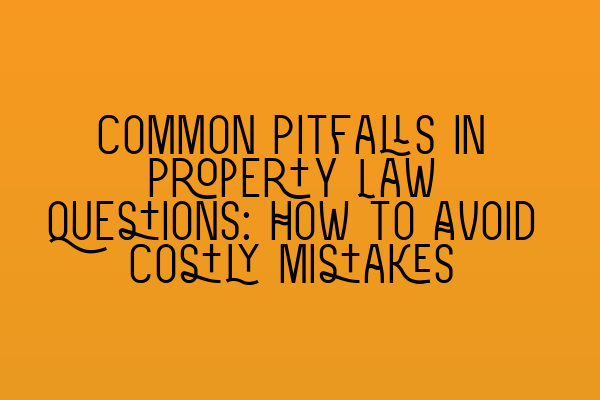Common Pitfalls in Property Law Questions: How to Avoid Costly Mistakes
As a solicitor specializing in property law, I have encountered numerous cases where individuals and businesses have made costly mistakes due to a lack of understanding or preparation. Property law can be complex and navigating through the various legal aspects requires a careful approach. In this blog post, I will highlight some common pitfalls in property law questions and provide practical tips on how to avoid making these costly mistakes.
1. Lack of Due Diligence
One of the most common mistakes individuals make is failing to conduct proper due diligence before entering into a property transaction. Due diligence involves thoroughly researching the property, reviewing legal documents, conducting inspections, and verifying the property’s ownership and title. By neglecting this crucial step, you may unknowingly inherit hidden problems and liabilities, such as outstanding debts or property disputes.
To avoid this pitfall, it is essential to engage the services of a qualified solicitor who can guide you through the due diligence process. They will help you identify and address any potential issues to ensure a smooth and trouble-free transaction.
2. Inadequate Understanding of Contracts
Property transactions are governed by contracts, and misunderstanding or incorrectly interpreting these contracts can lead to costly mistakes. It is crucial to carefully read and understand the terms and conditions outlined in the contract, including clauses related to price, payment terms, warranties, and liabilities.
To avoid this pitfall, seek legal advice from a property law solicitor who specializes in contract law. They will review the contract with you and explain any complex legal terms or conditions. Understanding the contract will help you make informed decisions and prevent any unexpected surprises down the line.
3. Failure to Comply with Planning and Zoning Laws
Another common pitfall is not complying with planning and zoning laws. Planning regulations dictate how a property can be used and developed, while zoning laws designate specific areas for different purposes such as residential, commercial, or industrial use. Failing to comply with these laws can result in fines, penalties, and even legal action.
To avoid this pitfall, it is essential to familiarize yourself with the relevant planning and zoning laws in the area where the property is located. Engaging a solicitor who specializes in property law and has local knowledge can help ensure compliance with these laws and prevent unnecessary legal troubles.
4. Overlooking Environmental Considerations
Environmental issues are a significant concern in property law, and overlooking them can lead to serious consequences. For example, a property may be contaminated with hazardous substances, or it may be located in a conservation area with restrictions on development.
To avoid this pitfall, conduct thorough environmental assessments of the property before making any commitments. Engage environmental experts to perform site assessments and surveys to identify potential risks. Additionally, consult with a solicitor experienced in environmental law to navigate any potential environmental issues efficiently.
5. Ignoring Tax Implications
Tax implications are often overlooked when dealing with property transactions, and this can result in unexpected financial burdens. Whether it’s stamp duty land tax, capital gains tax, or value-added tax (VAT), failing to consider and plan for these taxes can lead to significant financial setbacks.
To avoid this pitfall, consult with a tax specialist or a solicitor well-versed in property tax law. They can help you understand the applicable tax obligations, identify any exemptions or reliefs, and devise tax-efficient strategies to minimize your tax liabilities.
Conclusion
Avoiding these common pitfalls in property law questions is crucial to protecting your interests and avoiding costly mistakes. Thorough due diligence, understanding contracts, complying with planning and zoning laws, considering environmental implications, and addressing tax obligations are all essential steps in navigating the complexities of property law.
If you are preparing for the SQE exam in property law or looking to enhance your knowledge of property law, consider exploring our SQE preparation courses and practice exams. These resources will give you a deep understanding of property law principles and help you tackle property law questions effectively in the exam.
Remember, when it comes to property law, seeking professional advice from a qualified solicitor is vital. They can guide you through the intricacies of property transactions, ensuring a smooth and legally sound process.
Stay informed, stay prepared, and avoid costly mistakes in property law!
